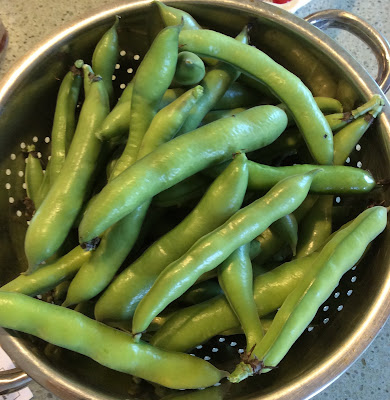 |
| Jerusalem Artichoke. 6.26.16 |
 |
| Bulb Onions. 6.26.16 |
Jerusalem artichokes are growing the best in 3 years. I have no idea why. The first year, they barely grew, then were eaten by deer. The second year, I did not see any growth. This year there are 2 gigantic plants. I did not plant them, so they were either dormant for a year, or I missed them last year.
 |
| 2nd Scion Take, Chocolate Persimmon. 6.26.16 |
The
bulb onions are bulbing up nicely. I have never grown them before. These are a yellow variety, bought and planted the sets late winter.
The second graft of the Chocolate Persimmon looks like it took. I don't expect much growth this year. Maybe next year both grafts will take off and grow.
 |
| Collard Greens. 6.26.16 |
 |
| Deer Fencing. 6.26.16 |
I think the limiting factor on
Collard Greens, is slugs. Since I put down slug bait, some are growing like crazy, others more slowly. This is my first try for Collard Greens.
I've been worried that
deer will take after the Carini fig and others in the row, that are looking so good. They ate leaves of a fig tree about 6 feet away. I finally added a strip of fencing. This is a fairly protected spot. The cost of
deer fencing can be exhorbitant. One of the most expensive parts of gardening. This time, I bought plastic fencing. Price is about 1/2 the metal fencing, it won't scratch me like 1,000 thorns, like chicken wire, and I think it should deter the deer. They are not aggressive, just persistant to consume anything they can easily reach.
Methley plums are almost ripe. We ate a few today.
 |
| Methley Plums. 6.26.16 |
 |
| Chinese Beans. 6.26.16 |
The
resurrected Chinese Beans look pretty good in general. I hope they continue to grow.
The
White Potato Onions, that I started last fall from sets from Territorial Seeds, are blooming. Apparently, that is a rare event and should be treasured.
In Utah, Kelly Winterton has been trying to resurrect (another ressurection) the variety by taking opportunity of potato onion rare bloom events to collect true seeds. There are several reasons-
Vegetative propagation of a variety over the decades - possily centuries - may weaken the strain due to somatic mutations ande viruses. Apparently, growing from seeds can restore the genetic potential and eliminate some, if not all, viruses that do not cross the seed barrier. The seed-grown onions may be much
larger and more vigorous, than the division-grown onions. Seed grown potato onions have potential to
develop new varieties. Since mine are blooming, I will see if they set seeds and if so, that will be a fun project. At the very least, I hope I get nice big potato onions from the seedlings.
Winterton speculates that
potato onions are a natural hybrid from centuries ago, which have been maintaned ever since, by vegetatice propagation. If so, he considers seedlings from this variety to be F2 generation, with a lot of diversity and unpredictablity. It is also possible, they could be pollinated by other onions around the yard. I have garlic chives in bloom - don't know of those can cross with potato onions. I removed all flowers from other onions.
Nikita's Gift Persimmon is looking great! Fruit are swelling nicely. I did some thinning but not too aggressive, because there are so many leaves and so few fruits. Still, it's possible there will be a dozen, maybe more, persimmons this year. If the persimmon gods smile upon us. This variety is vigorous, stout growth, very healthy appearing.
Saijo has a few potential fruits as well.
The first wave of
Sweet Corn, Trinity, is as high as my eyeballs. The secone wave,
Bilicious, is waist high. The 3rd wave, also Trinity, is almost knee high. Subsequent waves are smaller but growing. The last ones, seeds planted last week,
Bodaceous, have not emerged from the soil yet.
I tried to be creative with a tomato cage, made from bamboo and jute string. I don't know if that will deter the damn deer. The pictured tomato plant is a grafted Supersweet 1000.
 |
| Flowers on White Potato Onions. 6.26.16 |
 |
| Swelling fuit on Nikita's Gift Persimmons. 6.26.16 |
 |
| First Three Waves of Sweet Corn. #1 = Trinity, #2=Bilicious, #3=Trinity. |
 |
| Tomato Cage, maded from bamboo and jute string. 6.26.16 |




















































